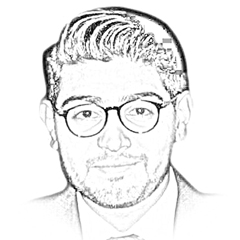As the course of Pakistan’s economy is in need of some serious reforms and policies, we have blinded ourselves by the curtain of religion. Time after time, Pakistan has been treated like a money-making object by corrupt politicians and parties. It is safe to say that every authoritative position has, at some point in time, taken personal advantage of their position — be it the army, the religious parties or the government itself.
The induction of Dr. Atif R. Mian, a veterinary economist, into the Economic Advisory Council (EAC) by Prime Minister (PM) Imran Khan hit the media by storm some months ago. Most political parties and politicians have raised grave concerns on the matter, simply because the man belongs to the Ahmadiyya community. In a matter of the state’s economic functions, religion does play its part but never does it exceed merit or logic.
Dr. Atif Mian happens to be a Pakistani-American economist, who also teaches Economics, Public Policy and Finance at Princeton University, one of the leading economic schools in the world. He is also the Director of the Julis-Rabinowitz Center for Public Policy and Finance at the Woodrow Wilson School. He is the first Pakistani who has been rated as one of the top 25 young economists of the world, expected to shape the worlds thinking about the global economy and macroeconomic effects of private debt by the International Monetary Fund (IMF) itself. Contributing the field of economics, Dr. Mian is also the co-author of the book House of Debt.
Rather than being blinded by the obscene religious curtain, we should open our eyes and look at the state of our economy. Comparing ourselves with our neighbours such as India, Bangladesh and China; the per capita income (PCI) of Pakistan was around 55 – 60 percent higher in 1980. As of now, Pakistan has the lowest PCI in this group at $1,222.52, whereas China stands at $7,329.09 and India at $1,963.55. Similarly, our gross domestic product (GDP) stands at $304.95 billion, whereas China and India have a GDP of $12,237.70 and 2,597.49 billion respectively.
The campaign against Dr Mian showed that we are our own biggest enemy
A fact that no Pakistani can deny, is that the need of the hour is for our country’s economy to progress, which will set us on the path of competing with progressive nations, instead of being a victim of their financial debts. For this to happen, we need to set aside our sentiments towards religion. The campaign started against Dr. Mian proved the point that we are the biggest enemies of ourselves.
However, all intellectuals and logical individuals were defending this appointment, arguing that religion should not reflect in the performance of professional duties. If we come to think of it, Islam upholds the principle of peace and working together to strengthen the weak points of our fellow brothers and sisters. Therefore, merit should not be mixed with religion, after all, competency and talent are the commodities which are most sought after today.
It is in that regard that having a notable and renowned economist such as Dr. Atif R. Mian working on our side should have been something to cherish and be proud of. If the IMF has applauded him for his work and his vision for the future of world debt, logically speaking, he can seriously aid Pakistan in reducing its economic debts to the IMF and other countries, whereby impacting in the growth of our GDP and all related matters.
Instead of demotivating him before he had even started, we should have supported him. The fruit of a better, more economically prosperous Pakistan would have been enjoyed by our children and the upcoming generations.
The writer is a freelance journalist, and a communications professional
Published in Daily Times, February 22nd 2019.
